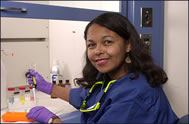|
Associate Professor, Biochemistry
School of Medicine
E-mail: sbarbour@hsc.vcu.edu
http://www.vcu.edu/biochem/faculty/barbour.htm
What drew you to the life sciences and why did you choose
your specific field?
My Grandfather was a chemist. I spent a lot of time with him and
became interested in research. I majored in chemistry and enjoyed
it very much. However, when I took a biochemistry course in the
junior year, I realized that I was really interested in “life chemistry.”
During my first year of graduate school, I rotated in a laboratory
that was interested in lipids and cell membranes. I was fascinated
by the ability of lipids to serve as both the “bricks and mortar”
that hold cells together and a storehouse of information that controls
cell behavior. In short, I was hooked.
Why did you decide to go beyond
the lab into the classroom to teach?
I enjoy watching the intellectual development
of young people and appreciate the chance to be a part of that process.
What
is your philosophy of teaching? How do you teach and why do it that way?
I try to teach “understanding,” not simply memorization. I think
it’s important for students to understand the “process” and the
theoretical underpinning of the “facts.” If you understand these
things, then you are not simply memorizing. In addition, this provides
you with the tools you need to ask your own questions and push the
field further ahead.
What is it you want your students to leave your class
with after it’s all over?
I want the students to appreciate the “science behind the facts.”
If they appreciate the experimental methods that are used to derive
the facts, I think they are likely to see the “beauty” in the science.
My ultimate goal is to convince the students to love science in
general and research in particular ... hopefully as much as I do.
What do you want students who
may be interested in any of the life sciences to know?
I want them to know that they cannot completely disregard the physical
sciences. Too often, I am disheartened when I work with life sciences
students who haven’t bothered to master basic math and chemistry.
These subjects are fundamental to the life sciences as well! You
simply cannot function in a laboratory without a clear understanding
of math, algebra, inorganic, and organic chemistry. Also, an understanding
of these topics provides you with a “framework” that makes it easier
to comprehend and apply the principles of life sciences. Also, as
math and chemistry are very “conceptual,” these subjects teach students
important problem solving skills. I encourage life science students
to take as many chemistry and math courses are their schedules allow.
What do you get out of teaching?
I get a lot of satisfaction from seeing the “lights come on” in
a student’s eyes. I enjoy watching students progress from “sponges”
who passively soak up information to intellectually engaged and
active participants in the learning process. I especially enjoy
taking questions in class, especially those that indicate that the
students are thinking “out of the box.”
Do
you learn anything from your students?
The students keep me “on my toes” with respect to areas of science
outside my own field. Often, they ask questions that I cannot answer
and this forces me to read the scientific literature to learn more
about a new and emerging field. Sometimes, I surprise myself and
learn something that I can apply to my own research efforts. Of
course, the students also teach me about teaching itself —
what works and does not work. Oh yes, and they keep teaching me
about the new (and interesting??) types of music that I would otherwise
not hear!
What do you do in your “free” time?
I
spend a lot of time in my research lab investigating the roles of phospholipids
and phospholipases in the regulation of cell physiology. I also enjoy gardening
and other outdoor activities.
Do you have any interesting or unusual hobbies?
I’ve
been a jazz enthusiast most of my life and spend entirely too much
time (and $$) on this hobby. I also enjoy getting the snot beat out
of me on the tennis
court.
Back to top
|





 Suzanne
Barbour, Ph.D.
Suzanne
Barbour, Ph.D.